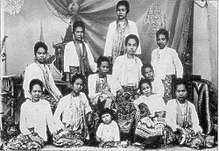LGBT history in Thailand
The history of lesbian, gay bisexual and transgender people in Thailand spans thousands of years. But because of ancient beliefs, homosexuality and homosexual relationships have been seen as an abnormality both socially and mentally. In the 20th century, LGBT people received more stringent legal regulations regarding their orientation, with restrictions being gradually eased by the beginning of the 21st century. However, activism for LGBT people has been slow in development due to government inaction.
Ancient
Homosexuality has been documented in Thailand since the Ayutthaya period (1351 to 1767) . ‘Samudthakhod Khumchan’ (สมุทรโฆษคำฉันท์), Thai literature from Ayuttaya times, mentioned lesbian relationships between the concubines living in the royal palace. In the poem, the writer wrote about the concubines sleeping together, some of them have their breasts exposed, some of them embracing each other in their sleep.[1]
Royal law in Borommatrailokkanat King (พระบรมไตรโลกนาฎ)’s Reign states that if the concubines act or treat each other as lovers, they shall be whipped 50 times.
Rama I-VIII
Prince Kraisorn
Prince Kraisorn, King Rama I’s son, had his own theatre group where all actors were male. Prince Kraisorn’s theatre group was known to be the most luxurious with all the expensive clothing and jewelry provided by prince Kraisorn to all the actors. These actors usually needed to dress up as females while performing and, with the support from Prince Kraisorn, they also dressed as females at public occasion like Loi Kratong festival.
According to the memorandum, Khunthong (ขุนทอง) and Yham (แย้ม) were two actors Prince Kraisorn adored the most, both Khunthong and Yham were patronized more than the rest of the actors. Prince Kraisorn never tried to cover up his sexuality and his preference. He unashamedly spent most of his time with these actors and usually spent the night with the actors in their home not in his palace, which was very uncommon for his position as a prince. This unusual behavior of Prince Kraisorn led to the investigation where the actors confessed to performing sexual interaction.[2]
Princess Yhuangkaew

In 1956 homosexual relationships were common among the maids working and living in the Royal palace. Princess Yhuangkaew was involved in a relationship with Mhom Ratchawong WongThep (หม่อมราชวงศ์วงศ์เทพ) but Mhom Ratcahwong Wongthep already had a lover at the time, who was also a woman, named Hoon. Out of jealousy, Hoon started a false rumor saying Princess Yhuangkaew was so infatuated with Mhom Ratchawong Wongthep that she gave all the jewelry she received from the queen to Mhom Ratchawong Wongthep. The rumor started spreading all around Royal Palace. After the queen found out about this false accusation, she furiously banished Princess Yhuangkaew back to Chiang Mai as a punishment. Humiliated, Princess Yhaungkaew decided to consult with Princess Buachoom, her friend at Chiang Mai.That night after Princess Buachoom fell asleep, wanting to prove her innocence, Princess Yhuangkaew jumped down from the top of the palace. She later passed away at the hospital at the age of only 19.[3]
Modern Thailand
LGBT and Military
In Thailand, all 21-year-old Thai men must partake in a lottery to determine whether they will become military conscripts unless they have attended at least three years of reserved military training during high school or are considered unfit to serve. Men reporting for the military draft are classified into 4 groups according to their physical condition. The first is person with normal physique, the second is person whose physique is unlike persons in the previous category, the third is person whose illness cannot be cured within 30 days and the fourth is person whose illness is incompatible with military.[4]
Transgender were usually classified in the fourth category and are automatically rejected and given an exemption document known as “Sor Dor 43” stamped with the wording “permanent mental disorder”. It was difficult for transgender to apply for jobs in government, state enterprises or any companies which require proof of military service.
Due to high pressure from the LGBT community, in March 2006, the military agreed to change the wording but refused to revise any already given Sor Dor 43.
On 11 April 2012, new regulations were issued under the 1954 Military Service Act to use the term “gender identity disorder” in military service exemption. Following this, transgender persons can request a new Sor Dor 43 with the new wording.
Mr to Miss
On August 9, 2012 Mr (now Miss) Sirinlada Khodpad along with Dr. Taejing Siripanich, committee of National Human Rights Commission of Thailand, and his parents arrived at district office to file a request on changing title, marked the first legal title change in Thailand, but only for intersex person.
At the moment title changing for transgender is still a controversial topic and has not yet been legalized
Media
In the past few years, higher visibility of LGBT acceptance is apparent such as in media : the growing numbers of television shows, dramas and movies concerning LGBT relationships and the increase in homosexual/LGBT character’s airtime on television.
Further reading
References
- ↑ "หญิงรักหญิงในวรรณคดีไทย : ผู้หญิงชอบสี่". GotoKnow (in Thai). Retrieved 2017-11-08.
- ↑ "การเล่นสวาท (ผู้ชายกับผู้ชาย) บังเกิดขึ้นในรั่ววัง". Postjung.com. Retrieved 2017-11-08.
- ↑ "การเล่นเพื่อน (ผู้หญิงกับผู้หญิง)". Postjung.com. Retrieved 2017-11-08.
- ↑ Suriyasarn, Busakorn. "PRIDE at work" (PDF).